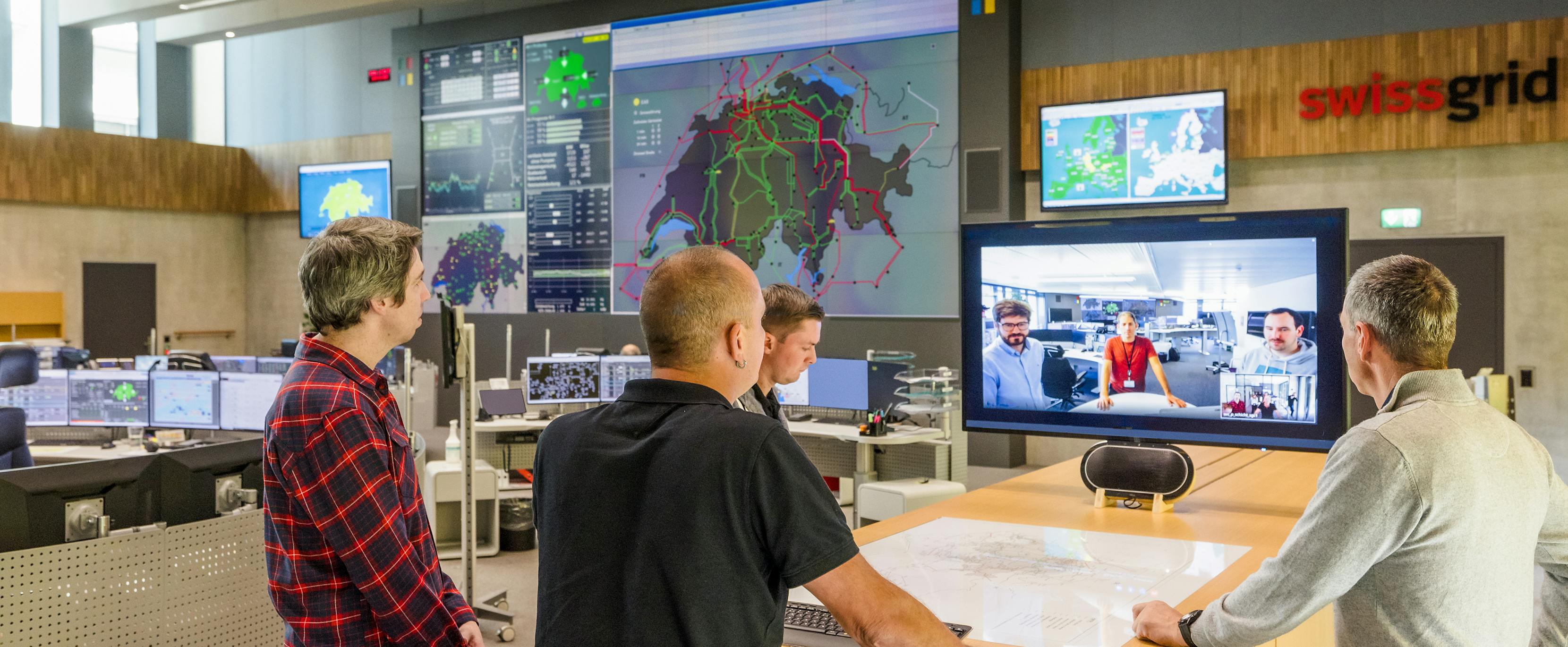
I usually go to the office for the standard nine-to-five workday. But today I’m not setting off for work until the evening. I’ll be in the Swissgrid building at 9 p.m., but not at my usual workplace: today I’ll be in the grid control room.
There’s a team on duty in the grid control room around the clock to monitor the extra-high-voltage grid – one of Switzerland’s most critical infrastructures – because without electricity, almost nothing works. Employees on the night shift have three different roles: System Management, Balancing & Scheduling and Regional Operations. For the next four hours, I’ll be there live while three of my Swissgrid colleagues control the Swiss transmission grid.
They monitor the grid while you sleep
The specialists from System Management keep an overview of the big picture – 24/7. One of their tasks is to issue orders for redispatch measures – i.e. targeted interventions in the electricity system if there is a risk of overload somewhere on the extra-high-voltage grid. In the past, it was rare to have to resort to this type of measure: «20 years ago, we needed redispatch measures about once a year,» explains Thomas Marti, Specialist System Operations. Today, it happens several times a day. This is mainly due to the increasingly fluctuating nature of electricity generation from renewable energy resources such as solar energy and wind. All the more reason for the Specialists System Operations to monitor the grid around the clock and to ensure that electricity continues to flow.
And the supply of electricity remained reliable, at least during this particular night shift. There were no major events in the electricity system that would have required the team in the grid control room to take action. Throughout his long career at Swissgrid, Thomas has never experienced the worst-case scenario – a critical grid situation. This would be a situation in which all the available measures in Switzerland and abroad have been exhausted. In this extreme case, Swissgrid would have to intervene directly in the power plant park.
20 years ago, we needed redispatch measures about once a year. Today? Several times a day.
Thomas Marti, Specialist System Operations
Balancing & Scheduling – keeping the balance
This aspect of work in the grid control room involves maintaining the balance between electricity generation and consumption – every second of the day. If the balance fluctuates, the experts in the control centre have to even it out. For example, by «injecting» or «withdrawing» energy. They do this with the help of platforms such as Picasso, which allow them to rapidly compare tenders from providers and choose the most economical solution. Gabriel, who is responsible for balancing the grid during this night shift, tried to explain the platform to me. Unfortunately, with limited success. Despite his detailed, transparent description, I understood only a fraction of what was displayed on his screen.
This shows just how complex European energy exchange is and why an electricity agreement is so important for Switzerland. An electricity agreement is the only way to ensure that Swissgrid can participate in all three European platforms for control energy. This would simplify or automate certain processes, making the operation of the extra-high-voltage grid in Switzerland even more secure.
Control – trust comes before hard facts
The Regional Operations team, also known as Control, manages all the outages and switching operations in the transmission system. If a line needs to be taken out of service, the request is received here four weeks in advance. The team then creates a switching order that will be implemented when the time comes. A circuit diagram can be prepared for planned outages. The outage process is always based on mutual trust, as explained by Holger: «The line engineers out on the pylons trust us to check that there really is no voltage on the lines. And we have to trust our colleagues in the field that all the safety measures are being complied with.»
However, not all line outages are planned. In the event of disturbances such as lightning strikes, severe storms, forest fires or avalanches, the team must keep a cool head, as these events can lead to unplanned line tripping.
Line outages are always based on mutual trust between the grid control room and the workers on site.
Holger Albiez, Specialist System Operations
I was impressed by what I saw during the night shift. The grid control room at Swissgrid is not a place for spectacle, but for quiet precision. It is thanks to the grid control room that we can turn on the lights in the morning, that our fridges work and that the trains are able to run – all as a matter of course.
But behind these things we take for granted are people who work with the utmost concentration and technical expertise to ensure that the electricity never stops flowing.




